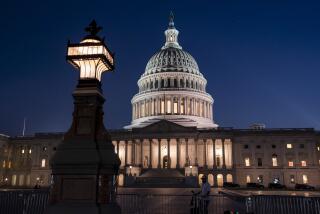Brazil’s Leading Party Accepts Debt Plan
- Share via
RIO DE JANEIRO — Despite sharp criticism from some of its members, Brazil’s dominant political party has accepted an agreement for resuming the country’s debt payments to private foreign banks.
The debt agreement, announced by Brazilian officials and a committee of bankers last week in New York, is aimed at lifting a moratorium on interest payments that Brazil declared in February.
The moratorium has had strong support from the Brazilian Democratic Movement, which holds a majority in both houses of the Congress. Party leaders complain that the cost of servicing Brazil’s $112-billion foreign debt saps the national economy and retards development.
About $70 billion of the $112 billion is owed to private foreign banks, which have received no payments from Brazil since February. Under the new agreement, Brazil will make 1988 interest payments on schedule while negotiating a broader agreement for restructuring the debt.
The bankers’ committee agreed to refinance temporarily most of the overdue 1987 interest, providing $3 billion in short-term bridge loans, and Brazil promised to make up 1987 payments of $1.5 billion. Initial disbursements of $500 million by Brazil and $1 billion by the banks are due by the end of the year.
The rest is due by June 16, when a three-year agreement is scheduled to take effect. That agreement is to be reached by Jan. 15 and ratified by more than 400 creditor banks by March 15.
In Washington, meanwhile, an Administration official said U.S. banking regulators, reacting to the agreement announced in New York, have decided not to lower Brazil’s credit rating, a move that would have meant new losses for banks with loans outstanding to Brazil.
Will Seek IMF Help
A decision to lower Brazil’s credit-worthiness from “substandard” to “value-impaired” would have required U.S. banks to set aside reserves equivalent to 10% of their exposure in Brazil.
In New York last week, Brazil also agreed to negotiate for financial support from the International Monetary Fund. The Democratic Movement has long rejected the fund’s credit conditions as recessionary and damaging to national sovereignty.
Many of the party’s congressmen protested immediately after the agreement with private banks was announced.
“Unacceptable, an abuse,” Sen. Severo Gomos fumed. “The party needs to oppose that agreement,” Oswaldo Lima Filho, a member of the Chamber of Deputies, commented.
Finance Minister Luiz Carlos Bresser Pereira and Fernao Bracher, Brazil’s chief debt negotiator, quickly launched a campaign for political acceptance of the agreement. They said the moratorium will be resumed next year if the foreign banks do not make concessions in restructuring the debt. And they emphasized that Brazil will not submit to recessionary requirements of the International Monetary Fund as a condition for concessions from the banks.
“At no point was there a commitment on a date for going to the IMF or on accepting any recessionary program that is not in accordance with our program,” Bracher said.
Bresser Pereira said: “The signed agreement makes it so that the International Monetary Fund does not have the power to oblige us to follow ideas that are not our own.” He called the agreement “a great Brazilian victory.”
More to Read
Sign up for Essential California
The most important California stories and recommendations in your inbox every morning.
You may occasionally receive promotional content from the Los Angeles Times.













